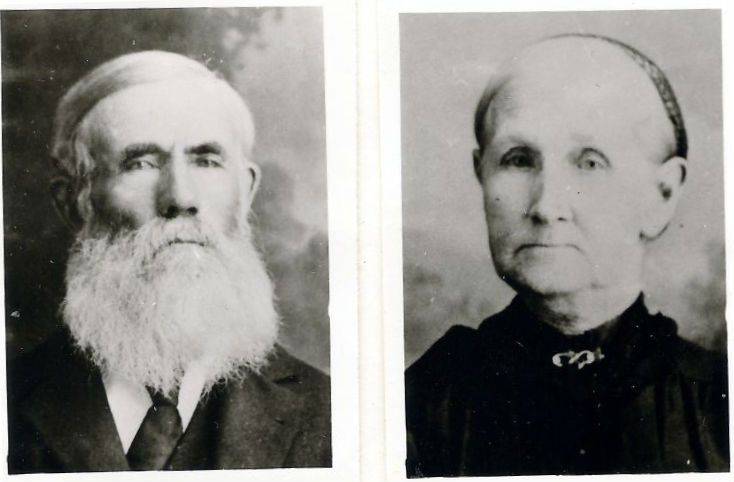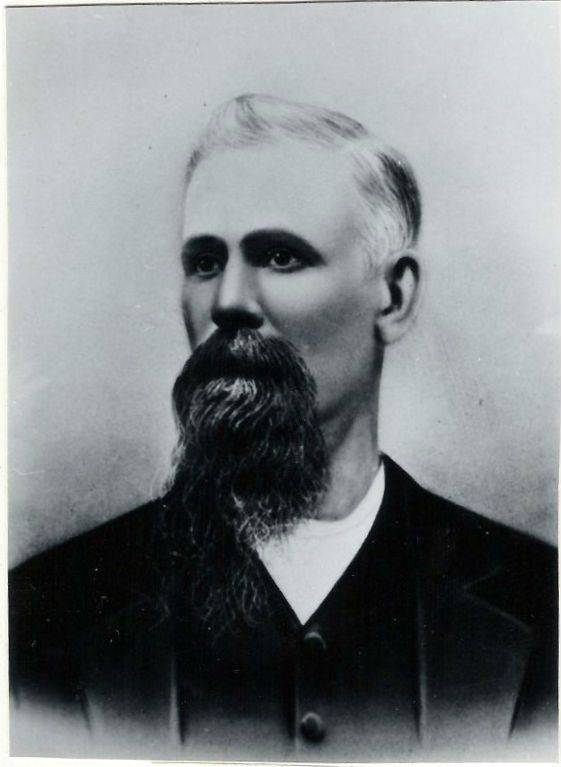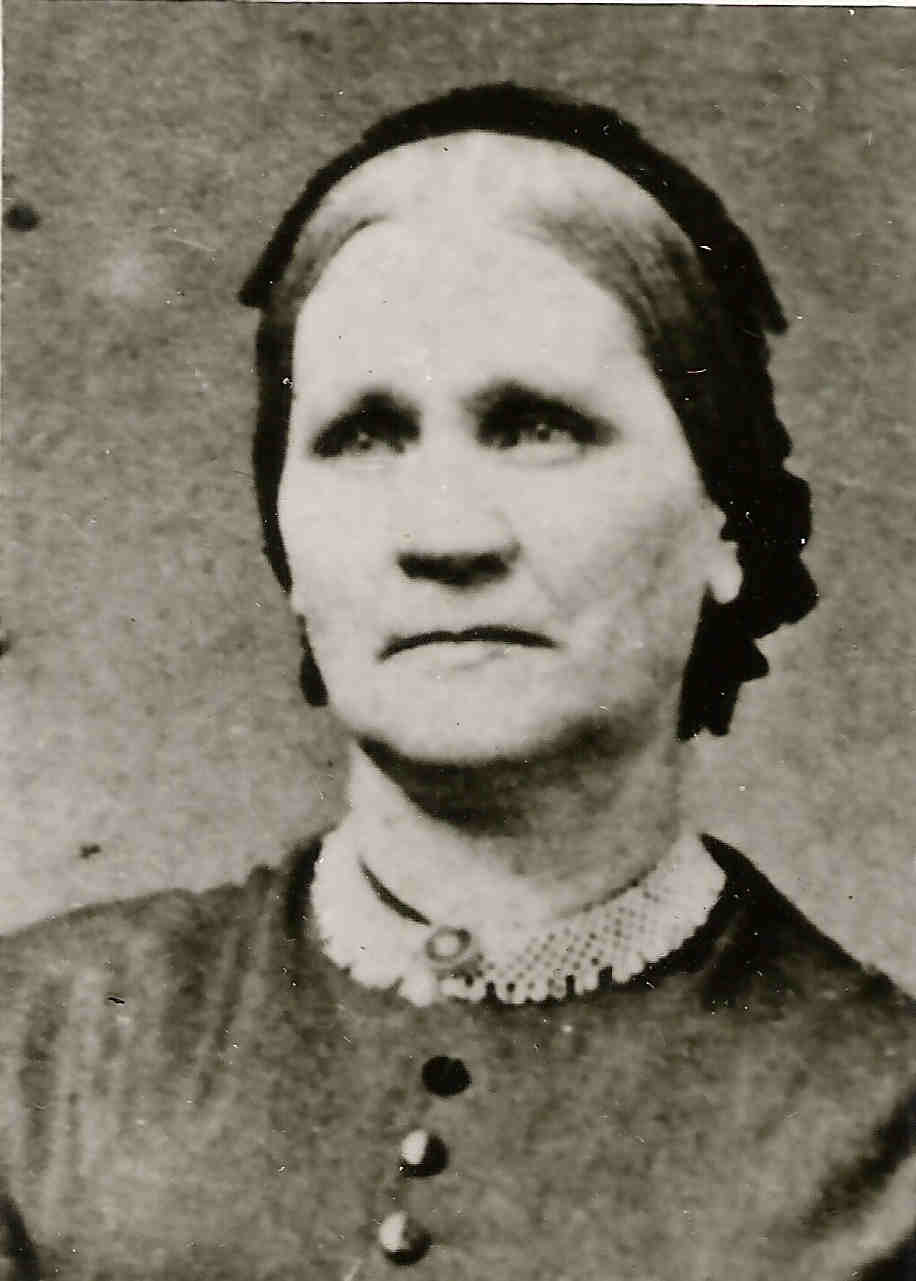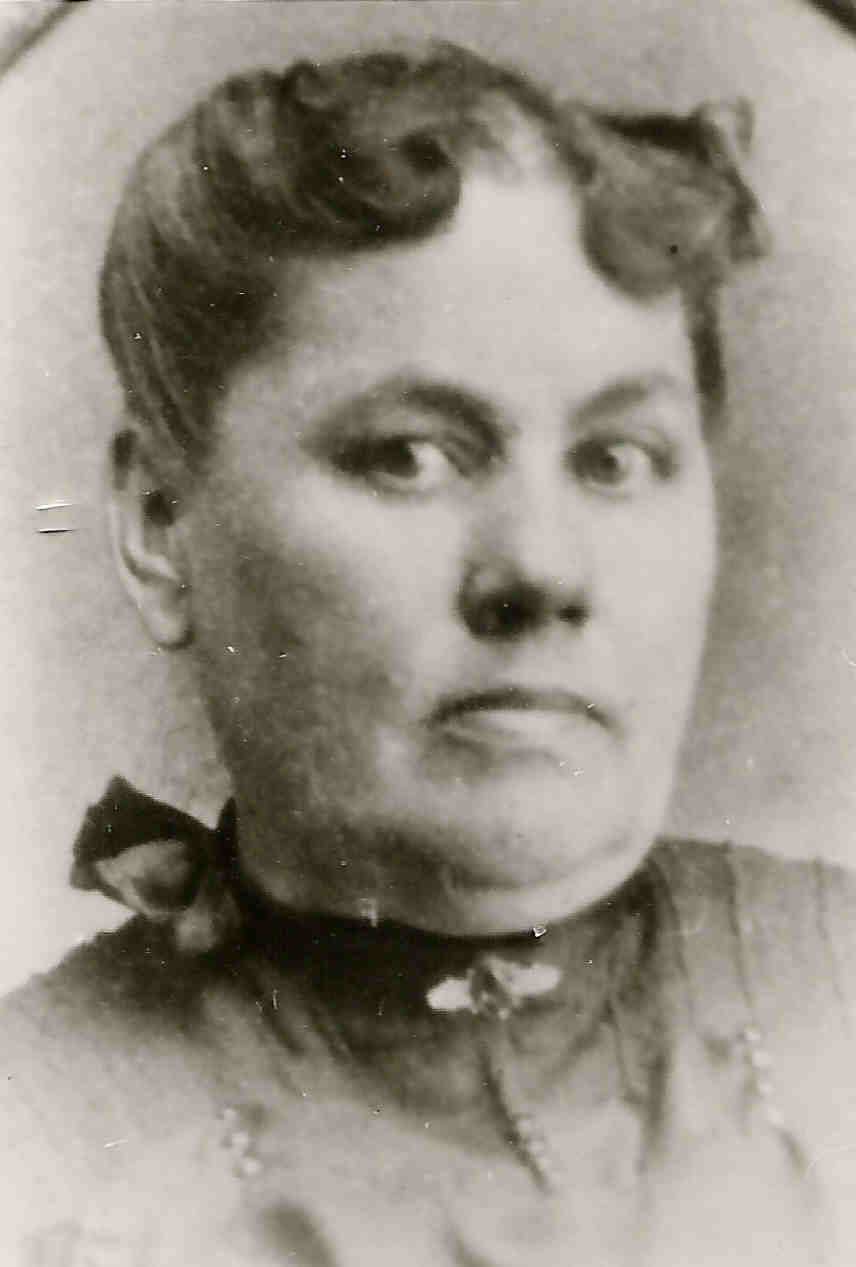Edwin Whiting’s Missionary Service – Documents and Letters
Edwin Whiting was called on a mission to Ohio in 1854, and he served until August, 1856.
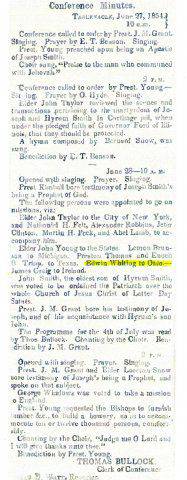
Source: Edwin’s Missionary Calling: Conference Minutes, Deseret News, July 6, 1854, pg 2
Set Apart as a Missionary: Edwin Whiting Missionary Set Apart
A blessing upon the head of EDWIN WHITING, given under the hands of Orson Hyde and John Taylor in the vestry of the tabernacle in Great Salt Lake City, 31August 1854, setting him apart for a mission to the Eastern States.
The blessing was not given in the world famous dome roof tabernacle. The construction of that building was begun soon afterward. The earlier tabernacle stood in the south side of Temple Square.
BROTHER WHITING, in the name of Jesus Christ, our Master, we lay our hands upon thy head, and set thee apart unto the mission upon which thou art about to be sent, that thou mayest have strength to perform all the duties in relation thereto, that thou mayest magnify thy office and thy calling, and not one hair of thy head shall perish or fall to the ground without the notice of our Heavenly Father.
We seal upon thee every blessing which thy heart desires to advance the Kingdom of God, that thine eye may be single and thy whole body full of light; that thy voice may be powerful and mighty and thy thoughts and meditations be the result of inspiration of the Holy Ghost; that thou mayest declare the testimony of the most High in faithfulness and in power; and do a good work in the field of thy labor; and thou mayest be preserved from the enemies of the truth, and have power to overcome them with everything that raises up against thee, either in the shape of disease or of the power of men or spirits of devils; that thou rnayest have power to overcome them and be successful in establishing the truth of our Father in Heaven, in the hearts of those who seek the redemption of Israel.
Grant, our Father, that the angels of thy presence may be with this, thy servant, that he may be kept and preserved, that his spirit may be pure, and his mind fruitful and not entangled with sin, but keep and preserve him as a monument of thy favor, pure and spotless to return in thy own time to rejoice in the midst of the saints of Zion.
These blessings and every blessing (Brother Whiting) thy heart desires, we seal upon thee in the name of Jesus Christ. Amen.
Published in The Whiting Red Book. Editor, Annette W. Farr (1969) Published here with Permission.
Edwin Whiting Missionary Letters and Newspaper Articles
#1
Nelson, (Ohio) April 15, 1855
Br. Carrington:
I left Great Salt Lake for my mission to the States, 8 Sept., 1854, with company of elders, among whom were br. John Taylor, and br. Preston Thomas was over out captain across the plains. We had a pleasant journey, and fair weather.
My field of labor was in Ohio, in company with br. Elisha Edwards. Br. Edwards and myself have preached in different counties, namely, Portage, Geauga, Cayahoga, Summitt, and Lorain. There is much opposition to the gospel. Where the people will hear us, they come our of curiosity and say they have got religion enough.
Elder Edwin Whiting writes from Hiram, Ohio, June 11, that he and br, Edwards had baptized 4 persons, and re-baptized one, and nine had promised to come forward. They met with much opposition, but were strong in the determination to search out the honest in heart, so far as they might be blessed with ability therefor.
Source: Deseret News, June 13, 1855, pg 4
(2)
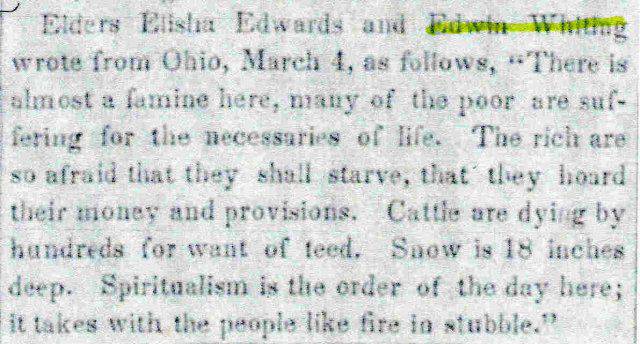
Elders Elisha Edwards and Edwin Whiting wrote from Ohio, March 4, as follows. “There is almost a famine here, many of the poor are suffering for the necessaries of life. The rich are so afraid that they shall starve, that they hoard their money and provisions. Cattle are dying by hundreds for want of feed. Snow is 18 inches deep. Spiritualism is the order of the day here; it takes with the people like fire in stubble.
Source: Deseret News, 23 May 1855, pg 5
(3)
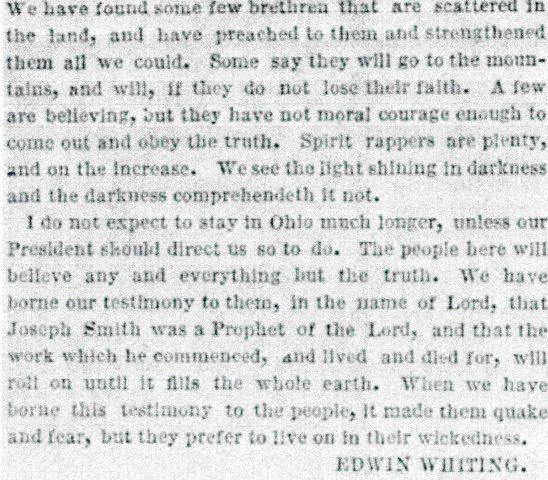
We have found some few brethren that are scattered in the land, and have preached to them and strengthened them all we could. Some say they will go to the mountains, and will if they d not lose their faith. A few are believing, but they have not moral courage enough to come out and obey the truth. Spirit rappers are plenty, and on the increase. We see the light shining in darkness and the darkness compehendeth it not.
I do not expect to sty in Ohio much longer, unless our President should direct us so to do. The people here will believe any and everything but the truth. We have borne out testimony to the, in the name of the Lord, and that the work which he commenced, and lived and died for, will roll on until it tills the whole earth. When we have borne this testimony to the people, it made them quake and fear, but they prefer to live on in their wickedness.
EDWIN WHITING
Source: Deseret News
(4)
July 1st,
Elders Edwin Whiting an Elisha Edwards were at Hiram , Ohio, baptizing a few persons.
Source: Deseret News: Sept 12, 1855, pg 5
(5)
Elder Edwin Whiting writes from Hiram, Ohio, June 11, that he and br. Edwards had baptized 4 persons, and re-baptized one, and nine had promised to come forward. They met with much opposition, but were strong in the determination to search out the honest in heart, so far as they might be blessed with ability therefor.
Source: Deseret News Sept 26th, 1855, pg 5 Letters from Elders
(6)
Emigrants for Utah
Members of the wagon Company list Hannah H. Brown, Edwin Whiting, Elisha Edwards (his missionary companon)
Source: Deseret News 6 Aug 1856. pg 8
(7)
Arrivals- Elder Philemon C. Merrill from his mission to England, reached this city on the 13th inst. He came in a little in advance of his company, for the purpose of making preparations for camping, herding stock, &c. Elder Merrill reported the company in excellent health and spirits.
On the 15th, Elder Samuel A. Wooley, from his mission to Hindostan, and Dr. Jeter Clinton, from his mission to the States, arrived in the same company; and on the 16th several more of the company rolled onto the public square in the 17th ward, among whom wee Elders Enoch B. Tripp, Elisha Edwards and Edwin Whiting, from their mission in the States.
The remainder of the company arrived on the 18th. The missionaries seemed much rejoiced with the privilege of again greeting their families and friends in the mountains, and of participating in the blessings which only the saints enjoy.
EldersWhiting and Edwards, with higly commendable forethought and care, brought several gafts from choice varitie of apple trees in the Western Reserve, Ohio.
Source:Deseret News, Aug 20 1856, pg 5
(8)
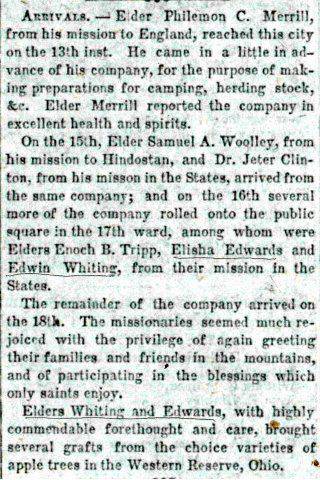
Arrivals—Elder Philemon C. Merrill, from his mission to England, reached this city on the 13th ___. He came in a little in advance of his company, for the purpose of making preparations for camping, herding stock, etc. Elder Merrill reported the company in excellent health and spirits.
The remainder of the company arrived on the 18th. The missionaries seemed much rejoiced with the privilege of again greeting their families and friends in the mountains, and of participating in the blessings which only saints enjoy.
Elders Whiting and Edwards, with highly commendable forethought and care, brought several grafts from the choice varieties of apple trees in the Western Reserve, Ohio
Source: Deseret News Aug. 1856
(9)
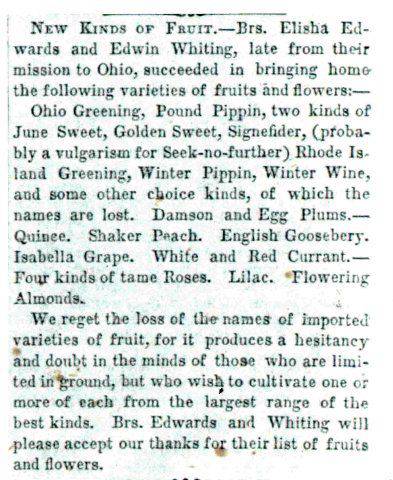
New Kinds of Fruit- Brs. Elisha Edwards and Edwin Whiting, late from their mission to Ohio, succeeded in bringing home the following varieties of fruits and flowers:-
Ohio Greening, Pound Pippin, two kinds of June Sweet, Signefider, (probably a vulgarism for Seek-no further) Rhode Island Greening, Winter Pippin, Winter Wine, and some other choice kinds of which the names are lost. Damson and Egg Plumbs, – Quinsee. Shaker Peach. English Gooseberry. Isabella Grape. White and Red Currant.-Four kinds of tame Roses. Lilac, Flowering Almonds.
We regret the loss of the names of the imported varieties of fruit, fit produces a hesitancy and doubt in the minds of those who are limited I ground, but who wish to cultivate one or more of each from the largest range of the best kinds. Brs. Edwards and Whiting will please accept our thanks for the list of fruits and flowers.
Source: Deseret News Aug.1856
Edwin’s letter to his family from the mission:
Hiram; April 22nd 1855
To my family, wives, children, brothers, sisters All.
God bless you all in Manti. I received a letter yesterday dated Dec. the 17th of which was a satisfaction to me to hear from you and learn that you are well. I am at Brother Hiny’s in Hiram. My health is very good at present. Brother Edwards had just returned from Cleveland. He is well. I was sorry to hear that sickness and death had made its way into your ranks. My prayer is that God may bless you all the day long. We have been a traveling and preaching until the people have refused to turn out to hear. We meet with much opposition. _________(Sencence on fold- not readable.) They say our business is to steal property and get more wives. They have gone so far in Hiram as to get up a spirit communication to learn how many wives we have got. They say that the spirits told them that Brother Edwards has twelve and that I had ten. We tell them their revelation is false, but we are very sorry. We have not received but seventy five cents in the last six months and we have been obliged to go to work to get a little clothing. Times are very hard; Cattle horses and sheep are dieing by hundreds for want of food. When I think of home and the blessings of God that surrounds the Saints I can hardly content myself to stay here any longer. All hell is afloat in this country; mobbing, murder, riots, war and bloodshed in every direction. This country is a perfect hell to me. Yet I mean to be contented whilst I stay. I have been staying at Polly’s (his wife’s sister) a few weeks. They are all well.
How soon I shall return I cannot tell. We expect to be governed by council. Prospects for doing much here at present is dull. I received a letter from Amos the other day. They were all well and calculating to go to the mountains this season_________(unreadable)___. When I see the wickedness of this generation and the signs of the times. The abuse of his servants it makes me feel strong in the work; For I feel that the words of the prophets are being fulfilled;
I want you should write as soon as you get this; George and Erastus Prichard (brother in laws) have made about one thousand lbs of sugar this spring. I have helped them a little about it so children look out for a lump when I come. I write no more at present; May the Lord bless you all amen;
My respects and love to all of my relation brothers and sisters in Manti; God bless you all
Edwin Whiting
Elizabeth
Almira
Mary
Punctuation and spelling original.
Source: Copy in the Marie J. Whiting Collection

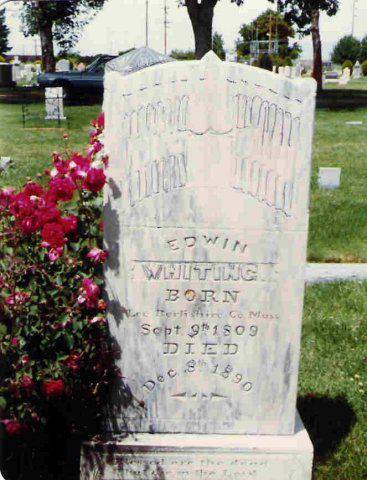
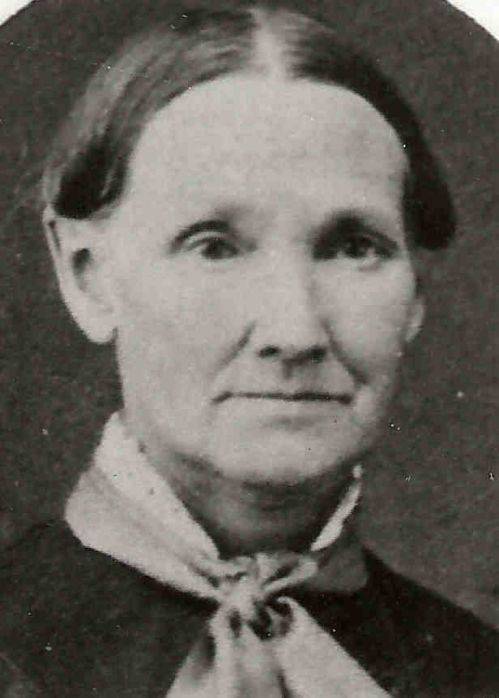

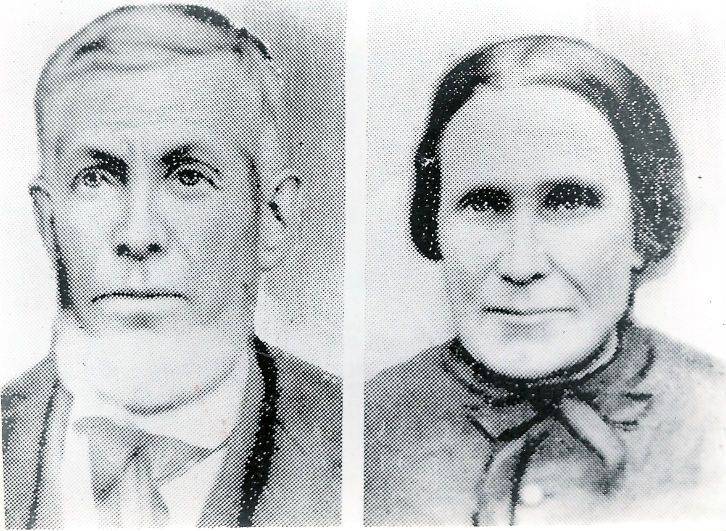
 Left: Chancey Whiting, Edwin’s younger brother; Right: Editha Morely Whiting wife of Chancey
Left: Chancey Whiting, Edwin’s younger brother; Right: Editha Morely Whiting wife of Chancey 